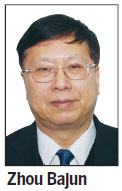Hong Kong SAR: The outlook beyond 'Occupy Central' campaign
Updated: 2014-09-29 05:47
By Zhou Bajun(HK Edition)
|
|||||||
Early on the morning of Sunday, Sept 28, following on the heels of class boycotts by some local university students last week, the illegal "Occupy Central" campaign officially began. The three initiators of "Occupy" announced the official start of the illegal movement at an overnight rally in front of the Hong Kong Special Administrative Region (HKSAR) Government headquarters, with co-founder Benny Tai Yiu-ting saying the campaign would attempt to "occupy the government headquarters first."
Now the people of Hong Kong are definitely concerned about how long Central might be "occupied" and how badly the city's finance, economy and people's livelihoods might suffer as a result. This depends on two interconnected factors. The first being whether "Occupy" turns violent; and the other whether the police can decisively and professionally control the situation.
Personally I don't think the opposition has the wherewithal to occupy and paralyze Central for even a week. I am fully confident the police will handle it properly and I believe the majority of Hongkongers are against unlawful behavior - particularly violence acts.
The fact it took the organizers a year and a half to finally launch their campaign indicates their lack of confidence in their political appeal. Hence their decision to test the waters with campus strikes last week. This also suggests the opposition camp has only managed to convince very few middle-aged residents, for whom personal careers and family interests always come first. Hong Kong has long been a business-friendly city. Although it has been experiencing heightened politicization since the handover, personal interests are the priority for the majority of local residents.
The police have faced some scuffles with the opposition over the past three years. They are proficient in handling sit-in protests. Should they arrest law-breaking protesters in a timely manner, the occupation won't become a long-term street fight that pushes the city into disaster.

So, I believe it is preferable to look beyond the "Occupy" episode.
First, some sort of international anti-China movement is forming. On Sept 26, groups in at least nine international cities - including New York, London and Toronto - joined together under the banner of Global Solidarity HK to support protesters in the Hong Kong government headquarters. The supposed "mainstream" international media criticized Hong Kong police in their handling of the protests while Joshua Wong, the head of local secondary school students' organization Scholarism, was lauded as "democracy baton in Hong Kong".
Second, the next round of public consultations on the method for the election of the Chief Executive (CE) by universal suffrage in 2017, and then the government bill in the two methods for the 2017 CE election and 2016 Legislative Council (LegCo) election will face further obstacles.
Prior to "Occupy" the opposition lawmakers had declared they would boycott the second round of consultations and veto the government bill. Subsequent to the "Occupy" campaign they will likely deliver what they promised.
Third, in the months ahead the SAR government will be tested by unprecedented challenges, the like of which have not been seen by any of its predecessors since the handover. Currently, the CE and his governing team have already confronted considerable obstruction in their policy-making and its implementation.
Due to the fundamental political situation, contradictions will worsen after "Occupy" and opposition lawmakers' continued filibustering will further impede the operation of LegCo, not only the bills on the 2017 CE election and 2016 LegCo election, but other bills on economic and livelihood issues will either be deferred or vetoed.
"Occupy" marks a historic turning point in HKSAR politics. Even if the incident is quickly contained, more acts of "civil disobedience" are expected to follow. In the coming months, or maybe years, the city of Hong Kong and its residents will witness significant changes that may greatly impact its economic and social development.
Both are laying the fundamental foundation for consolidating the return of the city to the motherland. The city, as I describe it in this column, like a phoenix rising from the ashes, has to resurrect itself to become stronger.
The author is a veteran current affairs commentator.
(HK Edition 09/29/2014 page7)